On March 19th-20th, Bijelo Polje hosted an extraordinary event: the International Slow Food Fair. It was organized on the main square, surrounded by a beautiful park with a huge monument – the Monument of Freedom – in the background. My first impression? A beautiful environment with a lot of picturesque wooden market stalls and a lot of sunshine and cheerful people!
More than 40 producers of organic food from Montenegro, Serbia, Albania, Bosnia & Herzegovina and Kosovo represented themselves at this Fair, which was organized by NGO Kisele Vode in cooperation with the Tourism Organization of Bijelo Polje.
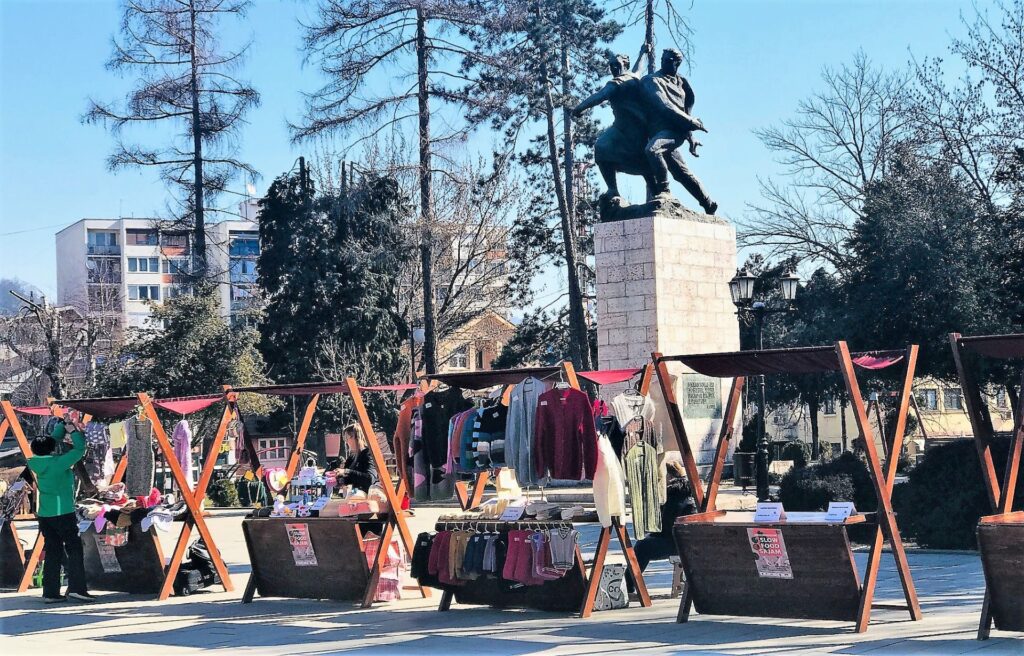
Promoting local, traditional, artisanal food products from Montenegro and the neighboring countries – that was the primary goal of the International Slow Food Fair. But this event was also dedicated to various products of domestic craft, herbal teas, etc. And last but not least, it showed how these traditional products can become a fresh impetus for the development of rural tourism in the northern part of Montenegro and beyond.
Slow Food – what exactly does it mean? Slow food is based on a concept of three interconnected principles: good, clean and fair. Food should be fresh and tasty, it should be part of the local cuisine, its production should not harm the environment and there should be fair prices for the consumers and fair conditions for the producers.
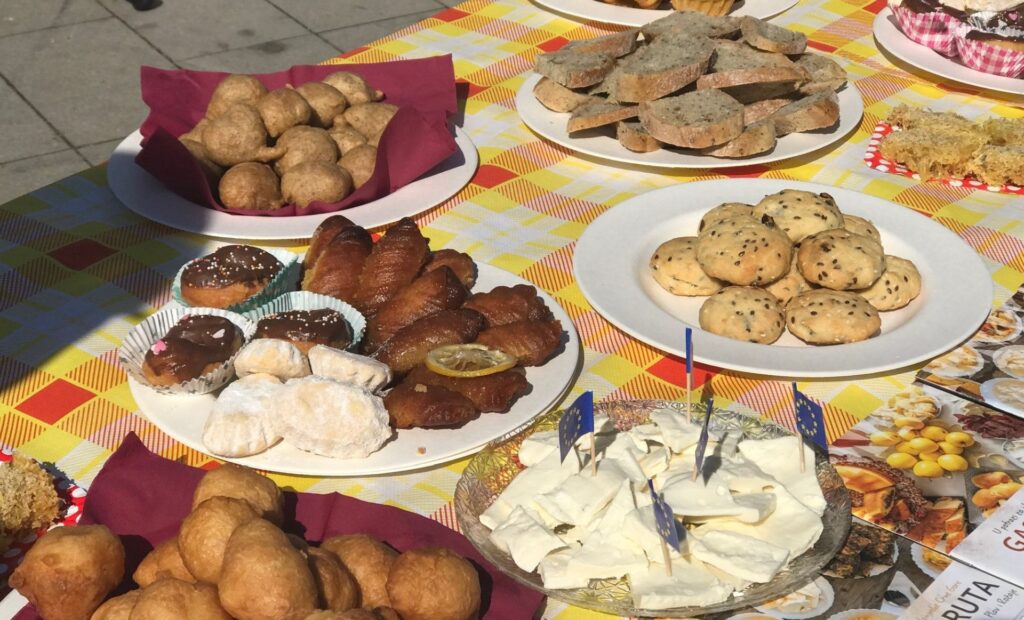
And that is just what the Slow Food movement wants to achieve! Local people in the countryside of Montenegro and the neighboring countries have grown up with knowledge of traditional recipes. They still work with wooden bowls, ceramic pots, private grain mills … and all the food is made without mixers, blenders, cutting machines or microwaves!
During the first day, we visited almost all participants. It was quite clear that women often play a key role in all rural households. They did not only sell food products at the Fair, but also domestic craft: woolen socks and sweaters, crocheted tablecloths, natural creams, medicinal/herbal teas, etc.
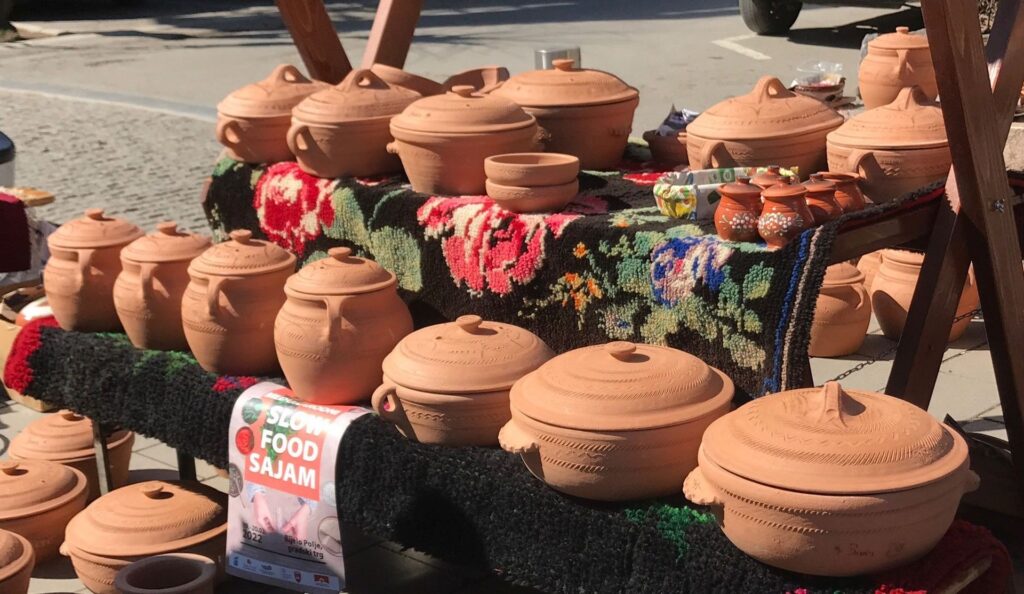
Other interesting products were wooden toys and souvenirs, traditional pottery, wooden spoons and bowls… But of course, we were especially interested in local food products.
You would be surprised to see such a variety of food and beverages. Some examples? Smoked beef ham and ‘sudžuk’ – a dry, spicy and fermented beef sausage – produced by Jasmin Ajanović without any additives; home-made cornichons; ‘ajvar’ – a condiment made of sweet bell peppers and eggplants – produced by Ajvar Radić from Velika Plana (Serbia); buckwheat flour; apple brandy; blueberry wine; layered cheese; rosehip jam; ‘gurabija’ (a kind of oriental cake); rose syrup; cherry liqueur …. Everything home-made and not for sale in the supermarkets!
Ilija Klisić from the Klisić winery that is located in the village of Limljani in Crmnica gave me some information about his products: ‘Our wine cellar has a tradition of several generations of wine producers and is known for its red wines ‘Crmnički Vranac’, i.e. Vranac from Crmnica. We participate in all domestic and international fairs and festivals, and our red wines ‘Sveti Toma’, ‘Cabernet Sauvignon’, Muscat wine and grape brandy have got many awards so far.’
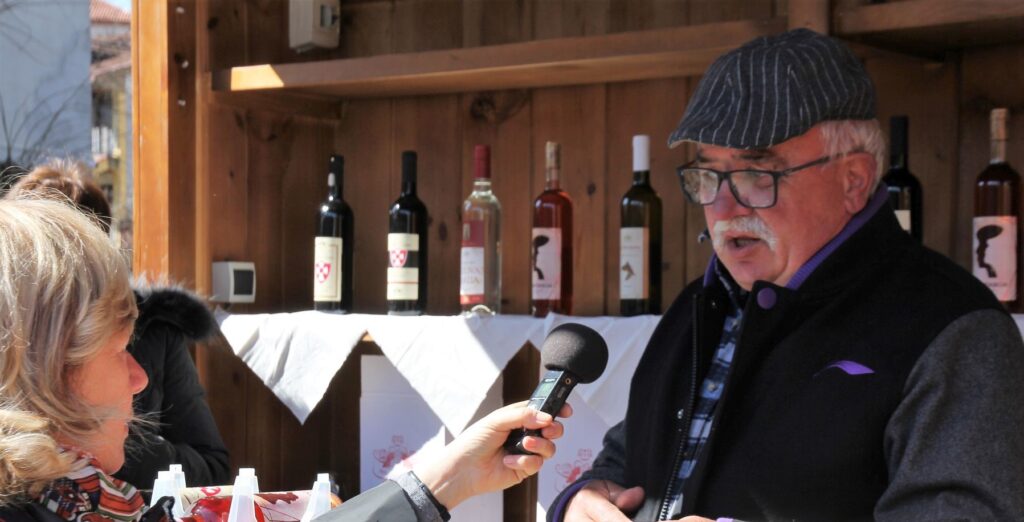
Mr. Klisić also told me about their problems in the covid-period: ‘Private wineries mainly depend on tourism. Why? Well, the Montenegrins – especially those who live in the villages – are not used to buying wine in the stores. Most of them have their own wine and, of course, wine is often used as a gift on the occasion of home visits, weddings and other celebrations.’
The Winery also produces dried figs. ‘Figs are a special gift of God’, Ilija said. ‘I would like to give you an advice, something useful for your health. Put three dried figs in a glass of red wine – Vranac – for 24 hours and drink it in the morning when you wake up. It is an excellent medicine for lowering cholesterol and anemia. Try it, it won’t hurt you!’
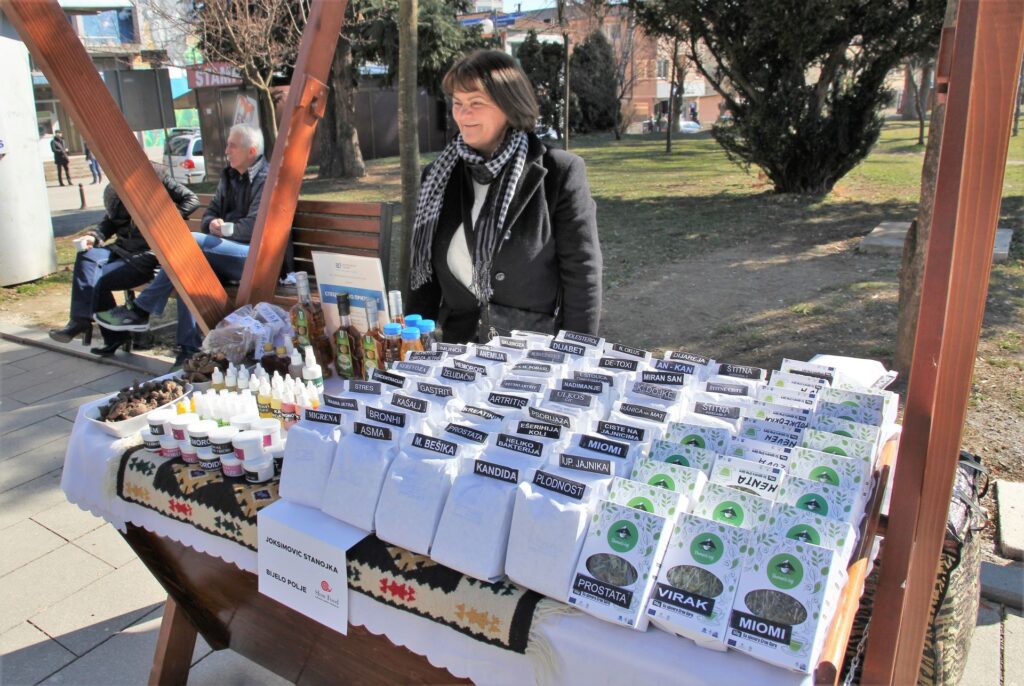
Walking around, we met an old friend: Stanojka Joksimović from the village of Rašovo. She is specialized in collecting herbs and roots in order to produce medicinal teas, tinctures and cream. She sells her products with great enthusiasm on fairs and exhibitions in the country and abroad, also with the support of Slow Food Montenegro
I asked her about her activities during the last few years and I was surprised to hear that she has been doing quite well. She has been selling many medicinal herbs for lung diseases, due to the covid pandemic. Stanojka is a hardworking woman: ’I often go to the mountains, I pick the medicinal herbs, clean them and pack them – all by myself’. Her advice? Use wild oregano, it is an excellent antibiotic, antiseptic and analgetic.
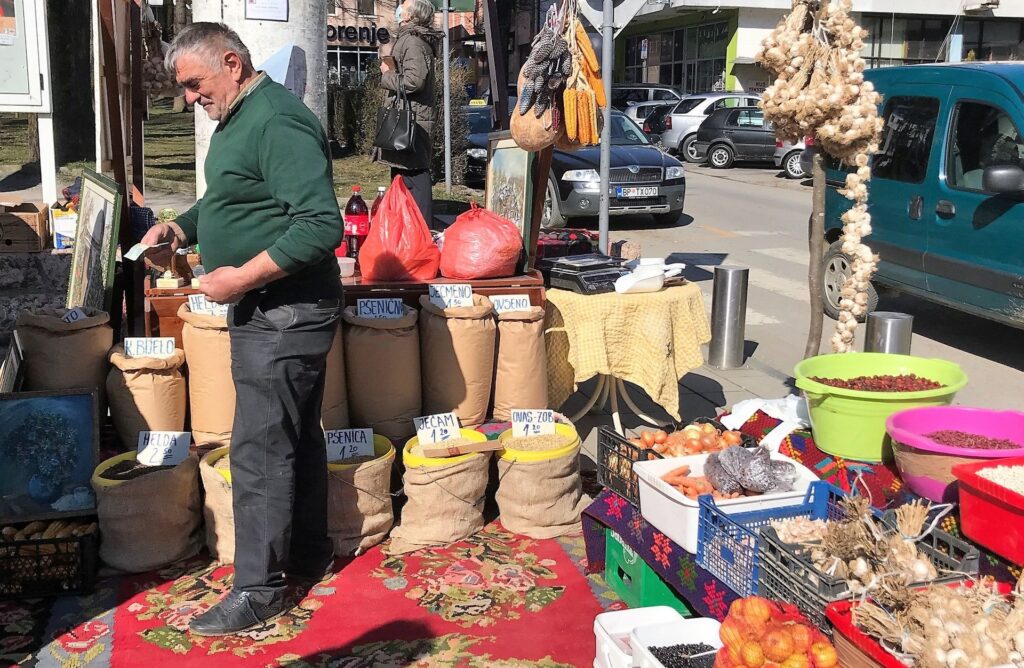
And finally, it was a special pleasure to meet the Hadžibegović family, Refko and Emina, as we visited their farm a few years ago. Refko has his own mills – one for corn and one for grain – and mills his own flour (corn, buckwheat, barley, oat, rye…) is famous all over the region and beyond. His wife Emina plays a special role in this family: apart from her regular duties in the rural household, she is a surprisingly good painter!
Refko’s spot at the Fair was not only very attractive because of the traditional carpets, old household items and Emina’s paintings, it was also quite diverse, as he didn’t only sell flour, but also eggs, onions, cabbage, garlic, apples …. All respect for these hardworking people!
But there is another topic I would like to share with you. It is a fact that more and more foreign tourists are showing interest in tours and visits of local rural households, where they can see and participate in preparing local food and learn more about life in the countryside. A good example is the brochure ‘Gastro-Route’ issued by the Regional Development Agency Bjelasica, Komovi & Prokletije. Every ‘slow food’ fan traveling to Montenegro should have this guidebook!
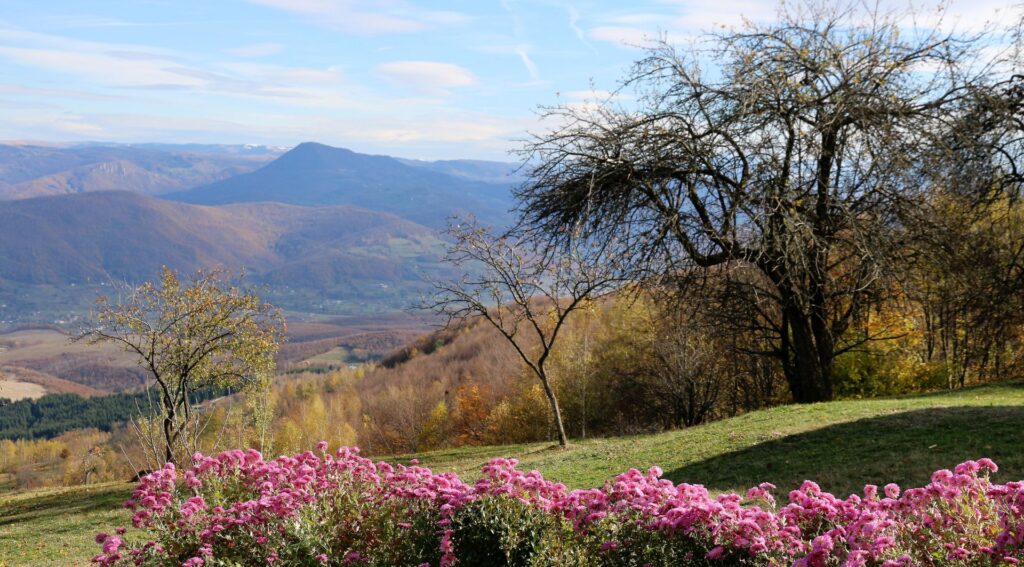
It is my opinion that ‘elite tourism’ does not mean accommodating well-to-do people in five-star hotels. All these hotels look like each other, in every country. I think that people who have traveled all around the world love experiencing something special, something exceptional. Many tourists coming from western countries would like to escape from the crowds and spend a few days in a (clean and comfortable) farm household, where they can enjoy nature, eat authentic food, learn more about traditional recipes and also try unusual fruit and vegetables, which are nowadays hardly used in Western Europe. This kind of tourism – which has been neglected for a long time – would be a perfect chance for the members of the Slow Food organization in Northern Montenegro and beyond.
Altogether: the International Slow Food Fair in Bijelo Polje – including the nice opening program with national music, folklore and food degustation – was a real eye-opener for us! Not to forget the nice working dinner for the members of the Slow Food organization in the traditional Čardak Restaurant in Bistrica, where they could exchange their experiences relating to their membership, biodiversity and networking.
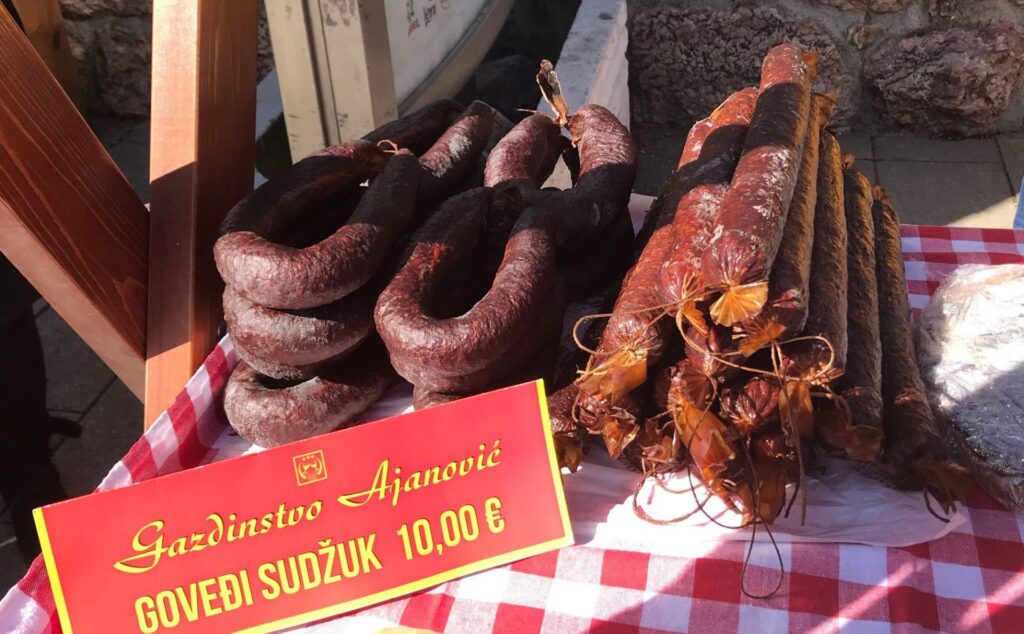
It would be a good idea to organize such or similar events in other municipalities in the northern part of Montenegro and beyond. Honestly speaking, I think that such annual fairs could also be organized during the summer season in July or August. With good promotion, it would be a very attractive event for foreign tourists.
By the way, my sincere compliments to the organizers of this event. I told Sabina and Musa Ramović from NGO Kisele Vode that they did ‘a hell of a job’. The answer? ‘It was the participants who made this Fair such a success!’
And of course, the International Slow Food Fair could not take place without the financial support from the Ministry of Economic Development and the Municipality of Bijelo Polje.
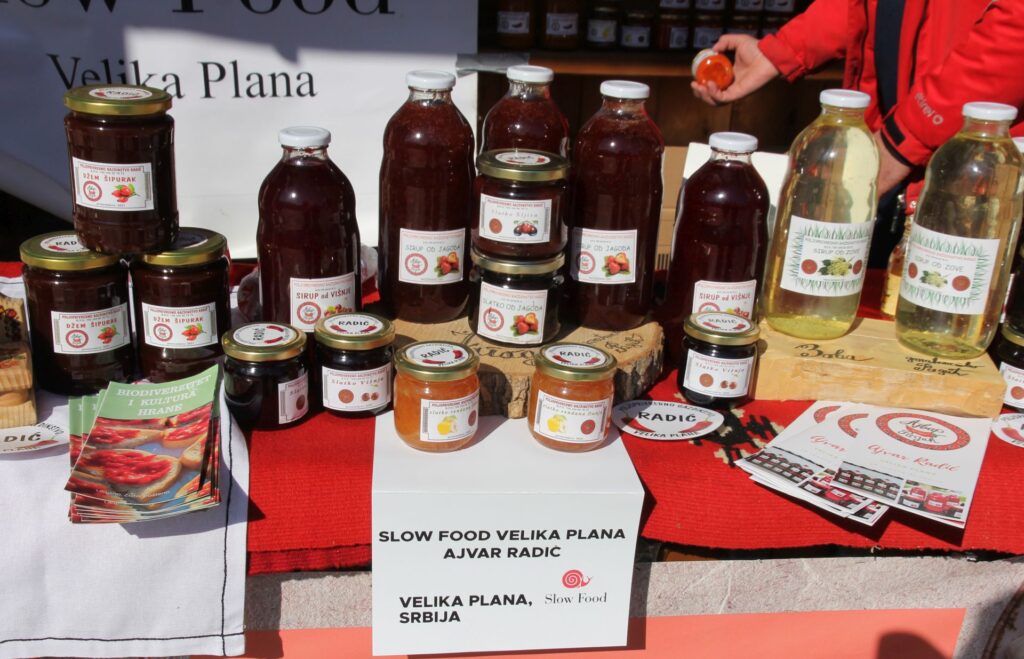
Finally, I would recommend to all foreign tourists and expats to buy local food products at the green markets and thus strengthen the local producers economically. Or maybe you are interested in cultivating your own vegetables and fruit? Believe me, preparing traditional ‘slow food’ is a huge pleasure. And enjoying such food is even better.
Should you be willing to join the Slow Food movement, you can learn more about it on the international website www.slowfood.com. For 10 € you can become a basic member for the period of 2 years.
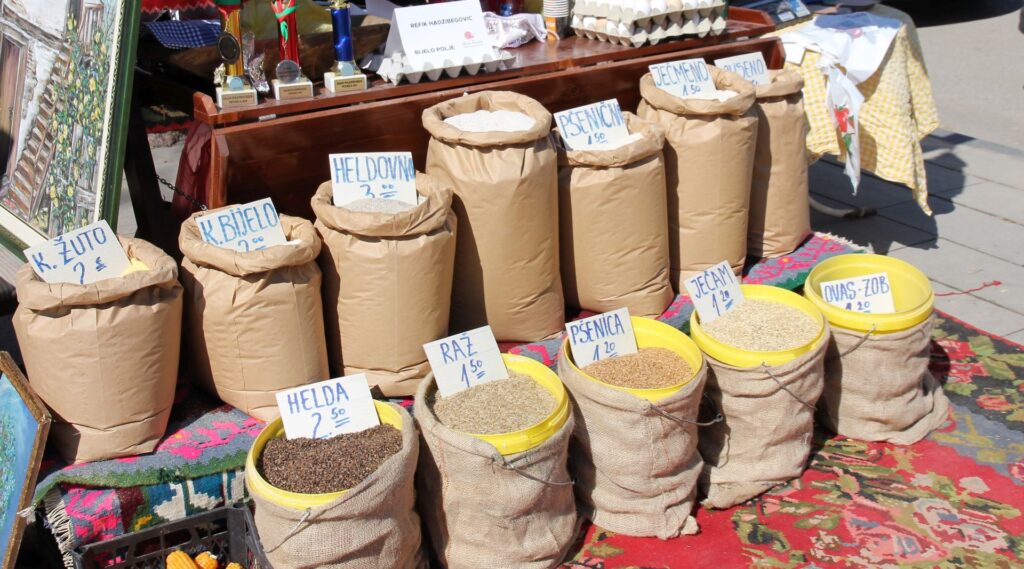
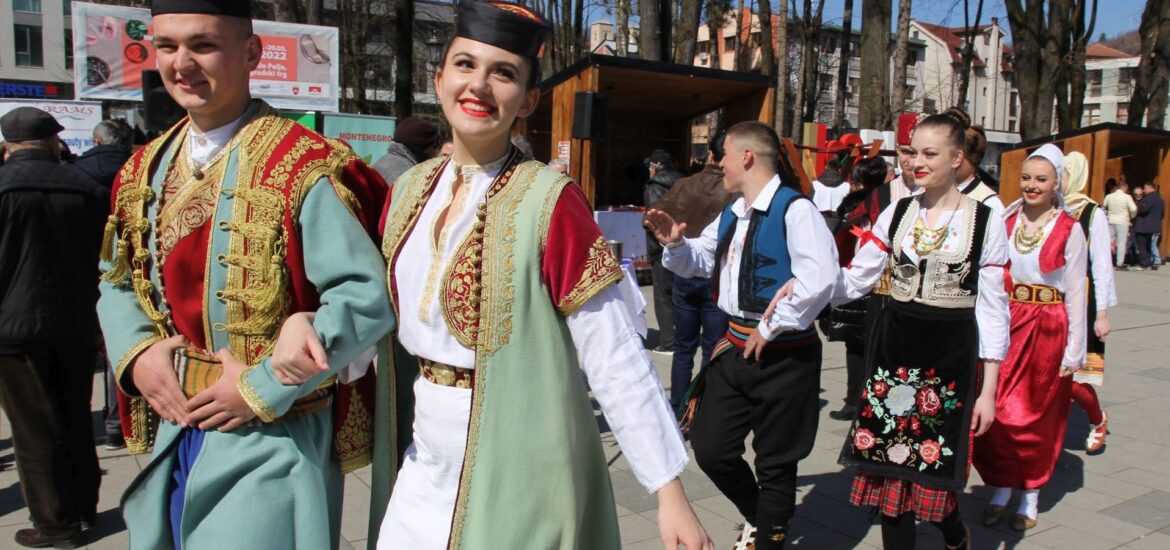
What a great experience for everyone involved. Thanks for taking the time to write about it and share your experiences.